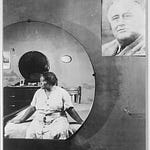Y’all heard the tale of High John and the Devil’s Daughter? Well, you think you did. Truth is the Devil never was a caricature pacing around in his brimstone offices underground. Nor is he at the Crossroads waiting on a deal. He’s not a Bluesman, a gambler or any spirit that aids in the freedom and dignity of my people. Some might call that kind of thing devilish––but nobody who has sense.
White folks love a sunbleached stranger, quiet and worn, blowing into town on a hot afternoon with hard eyes and a menace they find utterly erotic. With a good scrub and a soft sleep there was no doubt he'd be a prize. With white folks: seeing is believing, and they believed in him. A white outsider is never really outside; the white drifter is effortlessly at home wherever he wanders. And the nigger is the outsider in his own house, on his job, sometimes even in his mind.
The Devil is the biblical angel who fell, a handsome man. Hair like fire and skin so fair it look liable to burn in the type of heat he’s accustomed to. In those days the Devil lived under the name Ferguson, in the American South, and he settled quickly on a parcel of land called Sweetwater. It was his by marriage to a dreamy little thing who hoped she married an angel. He worked every trick in the book to get in her good graces. But one day after she’d borne him a child, fragile thing that she was, as Death appeared at her bedside Death recognized the Devil and allowed her to finally see what she had married. As she slipped away with Death she wept, knowing she’d left her best thing in this world for the Devil’s raising. And what he raised best was hell.
"Hell for whom", is the question. He was nice, in good company, but by the sharpness in his eyes and the turn of his smile one could see he was not kind. Nice was just a blade he used to get in closer, and cut deeper. He was cleverly cruel to everyone around him. Sometimes in ways they couldn’t even see. His effect was felt, like a bitter aftertaste or the ache in the burned skin before the proof of the blister. A lot of people died by accident or by their own hand, and none could rightly say why, except that there was a vague idea he’d been displeased.
John was also a man who wasn’t a man, barely a man in those days. Pretty like an angel, but unlike the Devil it wasn’t just in what you saw but how he made you feel. Same way Ferguson stirred up something hot and dreadful in a person John stirred up a grin or a belly laugh with something so simple as a well timed look. As if the existence of the Devil in Sweetwater necessitated that arrival of an equal and opposite force to maintain a spiritual balance. Tears and laughter, pain and pleasure, death and birth, fear and hope.
John had no particular interest in the Devil’s daughter. She looked every bit like her father, like he’d spat her out himself. She was avoided in much the same way as her daddy, but not because she was ever willfully cruel. It was because she was his. There could be no trust between anyone on that plantation and any Ferguson. Folks were polite enough, but hushed themselves when she approached and quickly went about their work elsewhere. Black men especially. There was scarcely a mature tree on the property that didn’t bear the scars of ropes and flames.
She was her father’s eyes. And ears. She spoke to him of the people he…they owned as though they were her dear friends. She lurked just far enough from them that she wasn’t easily detected but she could feel the warmth of their lives animating her own very empty, solitary one. She felt born to witness their triumphs and pain. But her obsession with John was another beast entirely. The Devil’s daughter was too lonely. And John had only to exist, exuding the most potent form of goodness that can be, for a child starved of goodness to latch onto. And the more mesmerized she was by this goodness, the more she pitied his condition. And the more she fell into the trap of talking him up to her daddy, making desperate appeals on behalf of John and all his ilk.
There is no reasoning with the Devil, no better nature to which one can appeal. There is no saving his spirit or catching his conscience. He exists because God lets evil exist. And God lets evil exist because God gave all God’s children free will, not imagining that the will to do evil might be so strong that the Devil wouldn’t even have to leave his property, let alone his porch, to do his job.
So the Devil’s daughter’s attempts to make her daddy good by telling him stories about niggers did nothing but inspire fresh ways for him to raise aforementioned hell against them. And even her. He hurt her, too. His love was warped by divine betrayal, by how he was wholly and holy abandoned, and while he kept her at arm’s length or under the toe of his boot he would never let her leave him except through death. And she got older, and lonelier, and lurked around niggers like a moth around a sizzling wick. That was what they took to calling her. Not in earshot, but with a fluttering of hands and a look a conversation or an activity would be extinguished and dull work would resume. Camphor and a covering were what devouring wings called for. Pity for such a creature did not erase its destruction.
But my Granny knew: all things in moderation. Pity had its uses. She was a woman I never met, gone long before I entered this world. Knocked off a tall tree from a short rope. My mama told me the story when I was small. My mama, Little Mary. Daughter of the one and only Big Mary: a conjure woman. My mama saw it all. And had to wait in silence as they lynched her mama right outside their door. All because the Devil found out Big Mary could see, and had recognized him. A gift he thought only Death had. An unguarded look on a long afternoon was all it took to set these events in motion. It didn’t matter if she intended to tell. By the very fact she had the magic that makes a Devil run, he knew he had to act fast, before she caught one of his footprints or a hair from his head. Before she laid a trick. Finessed a trap.









Share this post